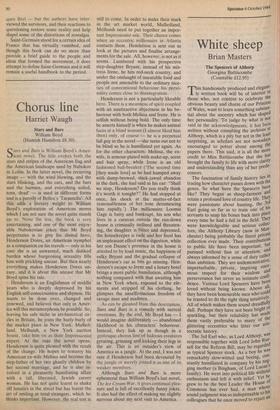Chorus line
Harriet Waugh
Stars and Bars William Boyd (Hamish Hamilton £8.50)
Stars and Bars is William Boyd's Amer- ican novel. The title evokes both the stars and stripes of the American flag and the American landscape used by Nabokov in Lolita. In the latter novel, the recurring image — 'with the wind blowing, and the stars blinking, and the cars, and the bars and the barmen, and everything soiled, torn, dead' — is used in different forms and is a parody of Belloc's 'Tarantella'. All this adds a literary weight to William Boyd's exploration of American mores which I am not sure the novel quite stands up to. None the less, the book is very entertaining, and one of the most enjoy- able Nabokovian jokes that Mr Boyd perpetrates is to give his dismal hero, Henderson Dotes, an American nymphet as a companion on his travels — only in his case she is an unwanted, much disliked burden whose burgeoning sexuality fills him with prickling unease. But then nearly everything makes Henderson Dores un- easy, and it is about this unease that Mr Boyd spins his tale.
Henderson is an Englishman of middle ' years who is deeply depressed by his English self-consciousness and shyness. He wants to be done over, changed and renewed, and believes that only in Amer- ica will this metamorphosis be possible. So, leaving his safe niche in art-historical cir- cles in Britain, he joins the hurly-burly of the market place in New York. Mulhol- land, Melhuish, a New York auction house, take him on as their Impressionist expert. At the time the novel opens, Henderson is quite pleased with the result of the change. He hopes to remarry his American ex-wife Melissa and become the step-father of her two ghastly children by her second marriage, and he is also in- volved in a pleasantly humiliating affair with a tall, liberated, Jewish career woman. He has not quite learnt to shake off lunatics in the street but has learnt the art of smiling at total strangers, which he thinks important. However, the real test is still to come. In order to make their mark in the art market world, Mulholland, Melhuish need to put together an impor- tant Impressionist sale. Their chance comes when an eccentric millionaire in Atlanta contacts them. Henderson is sent out to look at the pictures and finalise arrange- ments for the sale. All, however, is not as it seems. Lumbered with his prospective step-daughter Bryant, instead of his mis- tress Irene, he hits red-neck country, and under the onslaught of uneatable food and people not amenable to the ordinary nice- ties of conventional behaviour his perso- nality comes close to disintegration.
Henderson is not a particularly likeable hero. There is a meanness of spirit coupled with an unattractive abjectness in his be- haviour with both Melissa and Irene. He is selfish without being bold. The only time he asserts himself is when he makes animal faces at a blind woman (I almost liked him then) only, of course — he is a perpetual fall guy in the novel — she turns out not to be blind so he is humiliated yet again. As for the other characters: Melissa, the ex- wife, is armour-plated with make-up, scent and hair spray, while Irene is an old fashioned ball-breaker ('The second time [they made love] as he had humped away with damp-browed, slack-jawed abandon in the dark, she had said in his ear: "Shall we stop, Henderson? Do you really think it's worth it tonight?" He had stopped at once, his shock at the matter-of-fact reasonableness of her tone detumescing him rapidly.') The millionaire Loomis Gage is batty and bankrupt, his son who lives in a caravan outside the run-down house is criminally inclined and threaten- ing, the daughter is bitter and depressed, the housekeeper is rude and her food has an unpleasant effect on the digestion, while her son Duane's presence in the house is attested to by loud music, the happiness of sulky Bryant and the gradual collapse of Henderson's car as bits go missing. Hen- derson's escape to Irene and a luxury hotel brings a more public humiliation, although nothing compared with that awaiting him in New York when, exposed to the ele- ments and stripped of his clothing, he glimpses the unselfconscious freedom of savage man and madmen.
As can be gleaned from this description, Stars and Bars is a comedy with surreal overtones. By the end, Mr Boyd has — I would imagine deliberately — abandoned likelihood in his characters' behaviour. Instead, they link up as though in a grotesque chorus line of hideous creatures gyrating, grinning and kicking their legs in the air. This is an outsider's view of America as a jungle. At the end, I was not sure if Henderson had been devoured by the jungle or merely joined it as one of its weaker members.
Although Stars and Bars is more ephemeral than William Boyd's last novel, The Ice Cream War, it gives continual plea- sure and is full of excellently funny jokes. It also had the effect of making me slightly nervous about my next visit to America.














































 Previous page
Previous page